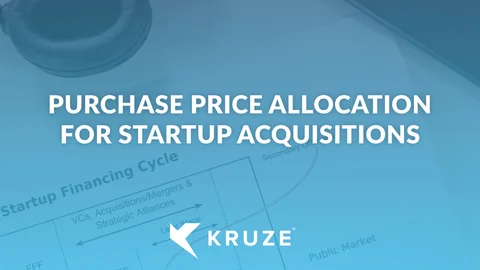
When a startup is acquired, one of the most critical – and commonly misunderstood – steps is the purchase price allocation (PPA). This accounting process determines how the total price paid for your company is divided among its various assets and liabilities, shaping post-deal financial reports, tax outcomes, and future strategic decisions.
What Is Purchase Price Allocation (PPA) and Why Does It Matter?
Purchase price allocation is the process of assigning the total consideration paid in a merger or acquisition to the tangible and intangible assets and liabilities of the acquired business at fair market value. The leftover value, after allocating to specific assets and liabilities, becomes “goodwill” – an important intangible that often represents your company’s brand, customer relationships, and growth potential. PPA is required by U.S. Generally Accepted Accounting Principles (GAAP) (ASC 805) for proper financial reporting, and is also filed with the IRS using Form 8594 for tax purposes.
Why PPA is Important
Why does this matter to founders? The PPA impacts your company’s post-acquisition financial statements, future depreciation and amortization, tax strategy, and how leadership, staff, and investors view the success of the deal. It is a key step in translating a headline deal value into line items that will shape the go-forward combined business:
- Accurate Financial Reporting. PPA ensures the balance sheet of the acquiring company reflects the fair value of the acquired company’s assets and liabilities post-acquisition, providing a clearer financial picture.
- Tax Implications. The allocation impacts future tax obligations, as different assets are subject to varying depreciation and amortization rates, affecting net income and cash flow.
- Regulatory Compliance. It is a mandated accounting procedure for all business combinations, ensuring compliance with financial and tax reporting standards.
- Strategic Decision-Making. The PPA process helps identify and value intangible assets and potential synergies, guiding strategic integration and future decision-making for the combined company.
The Steps of PPA in a Startup Acquisition
- Determine the Total Purchase Price. Add up all consideration paid – cash, stock, assumed debt, and earnouts.
- Identify Assets and Liabilities. List all tangible assets (such as cash, equipment, or inventory) and intangible assets (like patents, trademarks, and customer lists), then specify all assumed liabilities.
- Fair Value Assessment. Value each asset and liability at market rates as of the acquisition date, using accepted financial methodologies and, typically, outside appraisers.
- Allocation. Match the purchase price to the fair market values of assets and liabilities identified. Any excess is classified as goodwill, to be reviewed for impairment in future years.
For deals with contingent consideration – such as milestone-based earnouts – the estimated fair value of these payments is included in the total consideration paid and the PPA.
What Founders Should Expect Before, During, and After
- Before: Founders will need to organize documentation (financial statements, IP registrations, contracts), identify all assets owned (and liabilities owed), and work with advisors or accountants skilled in M&A accounting.
- During: The PPA process is collaborative, involving the acquirer, your finance/accounting team, appraisers, and tax professionals. Expect rounds of information-sharing and clarification to ensure all assets and obligations are properly identified and valued.
- After: The allocation shapes your company’s future tax filings, post-close integration, and how the acquirer and investors interpret the value of your business. Updates to the PPA may be needed if late-breaking information comes to light within a year of close.
Getting PPA Right
Accurately allocating your startup’s purchase price means maximizing the value of your company, reducing friction, and building a solid foundation for your company’s post-deal success. Expect careful documentation, rigorous asset valuation, and transparent collaboration with your advisors and the acquirer. Proper PPA is crucial to the success of any M&A transaction. Kruze Consulting’s clients are twice as likely to be acquired than other startups, so we have a lot of experience in getting clients ready for M&A. Contact us if you’d like to learn more about the M&A process and how we can help.












